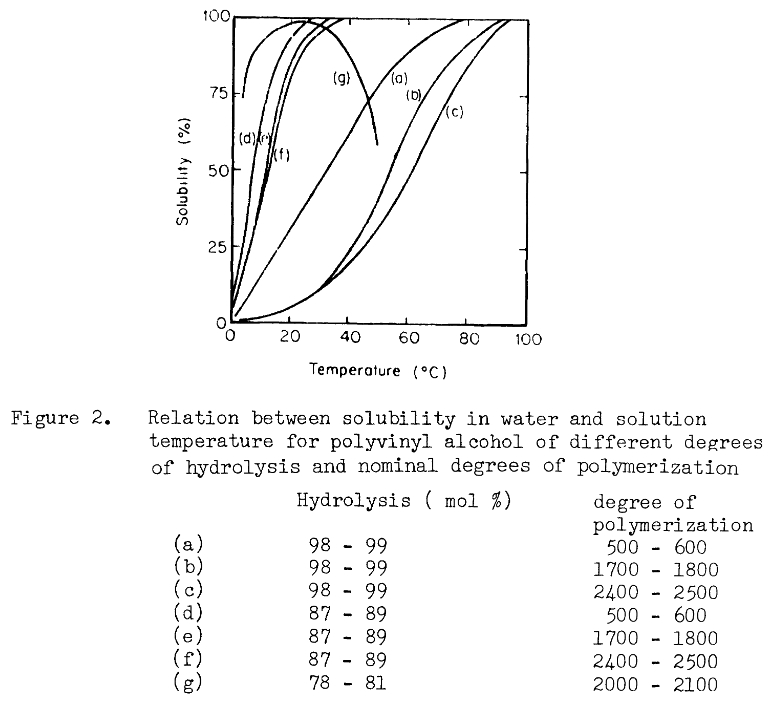According to Tager et al.[1]:
All the material described here is thus evidence of the complexity of the PVA-water system, and of the fact that the temperature coefficient of PVA solubility in water depends on the studied temperature and concentration ranges. [...] At medium concen- trations and fairly low temperatures, heating will improve the PVA solubility in water, but it will become poorer again at higher temperatures.
For more information, you can refer to the commentary they made on their Figure 4. Beware though, I read the article quickly and it seems that what they termed "solubility" is not the actual solubility $-$ in $g.L^{-1}$ for instance $-$ but is more like the thermodynamic affinity of the two compounds (water and PVA). I may have misinterpreted something though...
For a clearer view, you may also have a look at Finch[2]:
As you can see, the solubility strongly depends on the degree of polymerization of the PVA. Thus, depending on this parameter in your particular PVA, it may or may not be necessary to heat the water to have a better solubility...
Anyway, in your view of optimizing the process, the final decision should essentially depends on which factor(s) is(are) crucial for you: energy (for heating), water, or time.
Indeed, although the overall solubility ($g.L^{-1}$) of PVA in water can decrease with temperature in certain cases, if the kinetic of the reactions if favoured by an elevated temperature, you may want to heat your water anyway. Please note that solubility $-$ i.e. the amount of substance that you can dissolve in a given volume of solvent (in $g.L^{-1}$ or $mol.L^{-1}$) $-$ and rate of diffusiondissolution $-$ i.e. the speed at which a given compound dissolves (in $g.s^{-1}$ or $mol.s^{-1}$) $-$ are two different and possibly unrelated things!
Let say time is crucial for you, you would want to use a lot of heated water and replace it often, so as to "flush" your PVA with hot, 0%PVA water. The dissolution will probably be extremely quick but you will waste much water and energy.
At the opposite, if you are short on water and energy but have plenty of time. You may want to keep the amount of cold water minimal so that at the end of the dissolution, the water is just below the its saturation point with respect to PVA concentration.
- Tager et al. The effect of temperature on the water solubility of polyvinyl alcohol, Polymer Science U.S.S.R. Volume 13, Issue 3 pp751-758, 1971, DOI: 10.1016/0032-3950(71)90042-6
- C. A. Finch, Some Properties of Polyvinyl Alcohol and their Possible Applications, Chemistry and Technology of Water-Soluble Polymers pp 287-306, 1983, DOI: 10.1007/978-1-4757-9661-2_1710.1007/978-1-4757-9661-2_17

